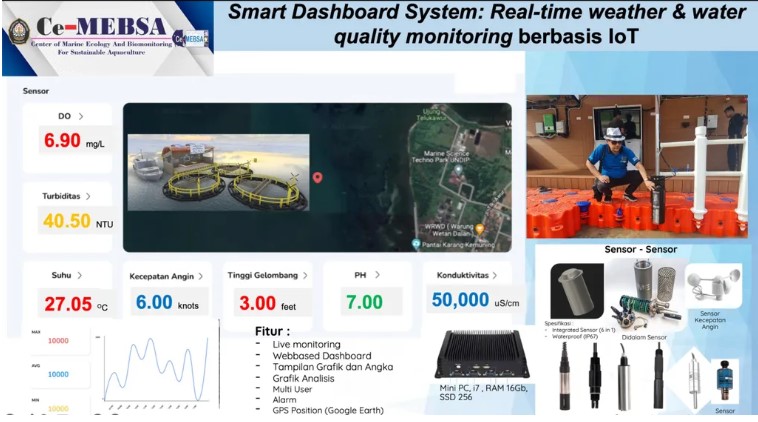The Faculty of Science and Mathematics (FSM) at Diponegoro University, through the Center of Marine Ecology and Biomonitoring for Sustainable Aquaculture (Ce-MEBSA), continues to advance sustainable aquaculture technologies. One of its flagship innovations is the development of the Smart Robotic Multi-Level Floating Net Cage (KJAB)-IMTA, an integrated, ecosystem-based aquaculture system enhanced with advanced technology and a smart dashboard.
According to Prof. Drs. Sapto Purnomo Putro, M.Si., Ph.D., Head of Ce-MEBSA and Chair of the Department of Biology at FSM UNDIP, this system was designed to address stagnation in traditional aquaculture ponds and promote environmentally friendly cultivation practices. The KJAB-IMTA model (Integrated Multi-Trophic Aquaculture) allows the co-cultivation of various aquatic organisms that complement one another within a single system. Organic waste from carnivorous fish species such as grouper and snapper is utilized by filter feeders like shellfish and seaweed, serving as natural biofilters.
The system has been tested across several coastal regions in Indonesia, including the Seribu Islands, Tanjung Balai Karimun, Karimunjawa, and Jepara. These trials demonstrated significant outcomes: improved feed efficiency, stable fish growth, and better water quality.
Moreover, KJAB-IMTA is equipped with smart feeders, real-time water quality sensors, and remotely operated vehicles (ROVs) for automatic monitoring. This technology improves feed conversion ratios (FCR) by up to 15% and reduces dissolved nitrogen loads by 40% compared to conventional systems. In addition to promoting sustainability, it also creates job opportunities in the marine software technology sector.
As part of the development, Ce-MEBSA has also launched an IoT-based smart dashboard system integrated with seven core modules:
- Smart Edu-Ecotourism – Supports educational tourism in aquaculture
- Integrated Smart Class – A floating classroom integrated with real-time oceanographic data visualization
- Sustainable Hybrid Power Plant – Renewable energy system powered by wind turbines and solar panels
- Smart Market and Smart Product – Digital marketing platform for aquaculture products
- Smart Security System – Integrated security with GPS tracking, motion sensors, hazard lighting, and remote CCTV
- IoT Water & Weather Monitoring – Real-time monitoring of water and weather conditions
- Geoportal Coastal Environment – Visualized marine data including depth, currents, waves, ecosystems, and substrate types
Among these, the Integrated Smart Class stands out as a hub for disseminating information, combining education, real-time data visualization, and interactive streaming via dual cameras — showcasing both surface and underwater activity within the net cage. This module serves as a dynamic learning platform with national and international reach.
Prof. Sapto emphasized that the KJAB-IMTA approach offers a practical solution to strengthen marine food security, enhance aquaculture productivity, and ensure environmental sustainability through the integration of technology, research, and community involvement.
“With ecological and digital integration, this system proves that modern, sustainable tropical aquaculture is not only feasible but highly relevant in Indonesia,” Prof. Sapto concluded.
FSM UNDIP, through Ce-MEBSA, remains committed to delivering science-based innovations for the advancement of sustainable modern aquaculture. The synergy between academic research, digital technology, and coastal community empowerment serves as a solid foundation in positioning aquaculture as a pillar of Indonesia’s blue economy.
This news article has also been published on Kompas and can be accessed through the following link:

